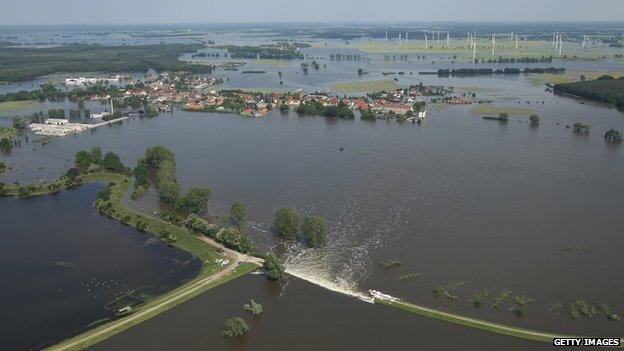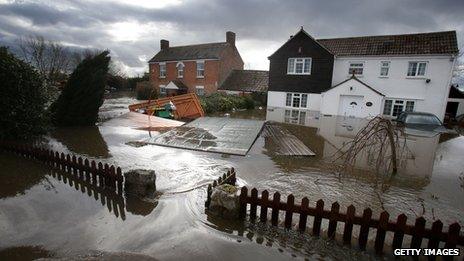Europe-wide flood losses to 'increase four fold' by 2050
- Published

Widespread flooding in Europe, such as on the Elbe in Germany last year, could become much more common
According to the most accurate model yet developed, flood damage losses across Europe are expected to increase four fold by 2050.
The scientists believe that the continent's annual flood costs may be 23.5bn euros by the middle of the century.
Two-thirds of the projected increase in flood damage will be caused by human development, not climate change.
The study has been published, external in the journal Nature Climate Change.
One of the big problems for European flood disaster research has been that countries tend to do their risk assessments on their own, using different models and methodologies compared with their neighbours.
"This is not an accurate way of working," said lead author Brenden Jongman from VU University in Amsterdam.
"We show that if you have very high flood risk in the UK there is also a very high risk in northern France, the Netherlands and some parts of Germany."
Risk underestimated
Rather than looking at individual flood risks, the team decided to look at maximum water discharges in over 1,000 European river sub-basins, or parts of catchments.
They found that different rivers often reach dangerous levels at the same time, threatening large regions.
"If you don't take into account these spatial co-relations then you highly underestimate the risk - there is a much higher risk than we actually think so far," said Mr Jongman.

The costs of this winter's floods in the UK are not yet known
"We say the average annual losses are expected to increase by a factor of four between now and 2050."
The researchers tested the model by looking at data from rivers between 2000 and 2012. From that information they estimated that annual flood losses across Europe would be 4.9bn euros per year. Reported annual losses were 4.2bn.
Using the same system, the team estimates that annual losses by 2050 across Europe would be 23.5bn euros.
Looking at the disastrous summer floods in Central Europe last year that cost 12bn euros in losses, the researchers estimate that the chances of an event like this happening in 2050 will have increased from once in 16 years to once in 10.
The scientists say that this is the first time they can look at the probability of total damages from floods across Europe.
And while climate change is an important factor, according to Brenden Jongman, it is not the critical element in their model.
"About two-thirds is caused by socio-economic growth," he said.
"More people are living in flood-prone areas, [and] the income per capita is increasing in the dangerous areas around Europe."
Muddy waters
Climate change cannot be dismissed and is likely to cause precipitation events to become more intense, and flood waters will likely be deeper and last longer.
While the increase in losses from floods is significant, the scientists believe that by investing in defences and mitigation, governments can limit the economic impact.
The amount of damages likely to be caused is far more than the costs of prevention, but Brenden Jongman says that political issues muddy the waters.
"The costs of these investments come up front, but the benefits of this flood protection might be in the future, not in the current government's term.
"There may be no votes for them."
Follow Matt on Twitter @mattmcgrathbbc, external.
- Published18 February 2014
- Published5 February 2014
- Published6 December 2013